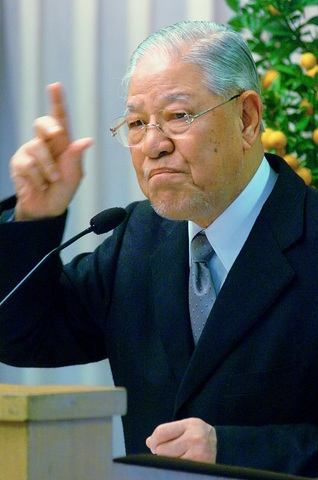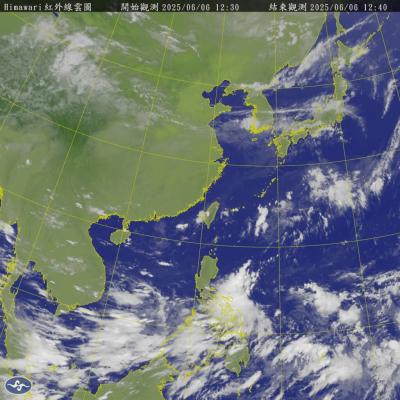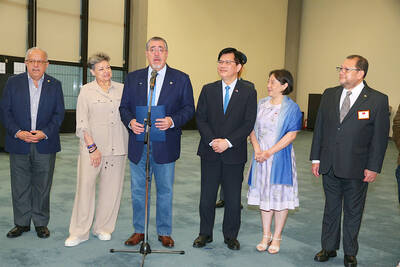Former President Lee Teng-hui (李登輝) yesterday expressed his disapproval with the 10-point consensus reached on Thursday between President Chen Shui-bian (陳水扁) and People First Party (PFP) Chairman James Soong (宋楚瑜), calling into question the joint statement's legitimacy and legality.
The joint statement signed by "the president, who is the head of state, and the chairman of a minor party, seemed like a diplomatic statement signed between two nations," Lee said.

PHOTO: SEAN CHAO, TAIPEI TIMES
"Where is its legitimacy or rationality? Simply put, it was wrong," he added.
Lee made the remarks yesterday while speaking at a forum sponsored by pro-independence groups on the issue of China's proposed "anti-secession law."
Lee's remarks would be the first time since Thursday's meeting that the former president publicly expressed his view on the consensus.
The agreement was produced following the Chen-Soong meeting, in which Chen reaffirms his "four noes plus one" pledge, including no declaration of independence, no change of the nation's official name, no referendum to change the status quo of the Taiwan Strait, no inclusion of the "state-to-state" theory on cross-strait ties in the Constitution and no disbanding of the National Unification Guidelines or the National Unification Council.
Many pan-green camp supporters were shocked by the agreement and criticized Chen for "surrendering to pro-unification forces."
Lee said that he, as well as all others, should not to have objected to whatever was discussed between Chen and Soong at the meeting, which was held for the sake of political stability.
The problem with the Chen-Soong meeting, Lee said, lied in the details of the 10-point consensus.
"Does [the consensus] represent Chen's own position, the Democratic Progressive Party's (DPP) position, the PFP's position or Chen and Soong's personal opinions?" he said.
The former president later called on the people of Taiwan to not be too nervous about the agreement.
"The democratic awareness of the Taiwanese people has improved, and we do not need to worry about rhetoric which looks down on democratic views," he said.
On the issue of Beijing's determination to enact its proposed "anti-secession law" when the rubber-stamp National Peoples' Congress meets early next month, Lee urged the public to speak out against the proposed law and not to allow China to unilaterally change the status quo. He also said the proposed law would deter Taiwan from becoming a "normal" country.
The former president also took the opportunity to express his concern about the "rapid cross-strait economic integration." Taiwan could fall into Beijing's trap, using its increasing economic clout to advance its goal of unification, Lee said.
Lee also said that the nation's economic policies should not be separated from politics, and that "the government should not exclusively consider views of businesspeople."
With the 228 Peace Memorial Day approaching, the former president said the event, although having left an unforgettable impact on society, was also a valuable history lesson for people of Taiwan, as it leads one to reconsider the idea of the "motherland" and relations between Taiwan and China.

Greenpeace yesterday said that it is to appeal a decision last month by the Taipei High Administrative Court to dismiss its 2021 lawsuit against the Ministry of Economic Affairs over “loose” regulations governing major corporate electricity consumers. The climate-related lawsuit — the first of its kind in Taiwan — sought to require the government to enforce higher green energy thresholds on major corporations to reduce emissions in light of climate change and an uptick in extreme weather. The suit, filed by Greenpeace East Asia, the Environmental Jurists Association and four individual plaintiffs, was dismissed on May 8 following four years of litigation. The

STAY AWAY: An official said people should avoid disturbing snakes, as most do not actively attack humans, but would react defensively if threatened Taitung County authorities yesterday urged the public to stay vigilant and avoid disturbing snakes in the wild, following five reported snakebite cases in the county so far this year. Taitung County Fire Department secretary Lin Chien-cheng (林建誠) said two of the cases were in Donghe Township (東河) and involved the Taiwan habus, one person was bit by a Chinese pit viper near the South Link Railway and the remaining two were caused by unidentified snakes. He advised residents near fields to be cautious of snakes hiding in shady indoor areas, especially when entering or leaving their homes at night. In case of a

A tropical disturbance off the southeastern coast of the Philippines might become the first typhoon of the western Pacific typhoon season, the Central Weather Administration (CWA) said. The system lacks a visible center and how it would develop is only likely to become clear on Sunday or Monday, the CWA said, adding that it was not yet possible to forecast the potential typhoon's effect on Taiwan. The American Meteorological Society defines a tropical disturbance as a system made up of showers and thunderstorms that lasts for at least 24 hours and does not have closed wind circulation.

DIPLOMACY: It is Guatemalan President Bernardo Arevalo’s first visit to Taiwan since he took office last year, while Eswatini’s foreign minister is also paying a visit A delegation led by Guatemalan President Bernardo Arevalo arrived in Taiwan yesterday afternoon and is to visit President William Lai (賴清德) today. The delegation arrived at Taiwan Taoyuan International Airport at 4:55pm, and was greeted by Minister of Foreign Affairs Lin Chia-lung (林佳龍). It is Arevalo’s first trip to Taiwan since he took office last year, and following the visit, he is to travel to Japan to celebrate the 90th anniversary of diplomatic relations between the two countries. Arevalo said at the airport that he is very glad to make the visit to Taiwan, adding that he brings an important message of responsibility